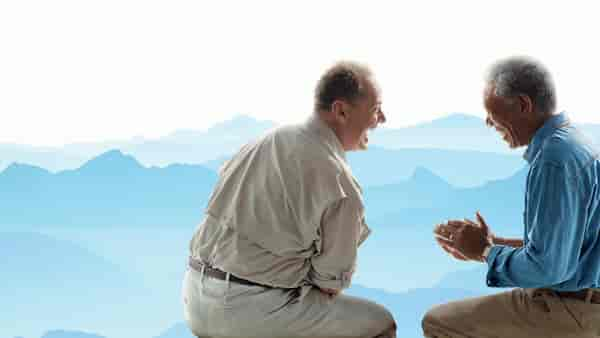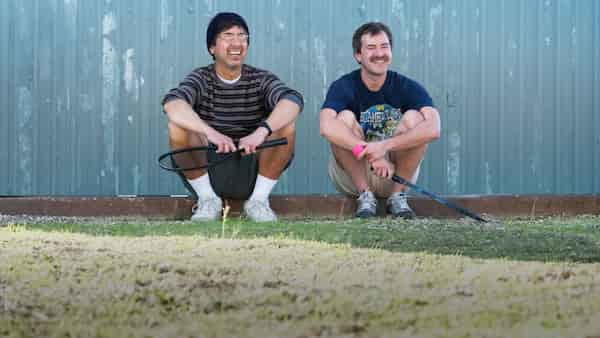The Bucket List, Paddleton, The After: The Multiverse Of Melancholy
This is #ViewingRoom, a column by OTTplay's critic Rahul Desai, on the intersections of pop culture and life.

Promo poster for The After. Netflix
Last Updated: 01.14 PM, Sep 08, 2024
IN MANY WAYS, grief is the multiverse of sadness. (Take that, Marvel). Non-puns aside, so much of grieving is the inability to comprehend a lesser timeline. It’s the ceaseless anxiety of knowing that you could have been a fuller person in a happier place at the same time. It’s the sinking sense that you’re living in an alternate reality – a parallel world you didn’t choose for yourself but must now inhabit. You miss the person, of course, you miss the life they might have had, but most of all you miss the person they could have made you. So you’re missing a stranger and pining for a surrogate adaptation of yourself at once.
After losing my best friend last year, I’ve been flooded by the dichotomy of every moment since. I wake up in the morning, brush my teeth and imagine I’d be brushing my teeth differently – maybe faster, perhaps gentler – if he were still around. I drink my coffee, browse through my phone and wonder if I’d still be browsing if he had texted me. I’d probably be smiling at his corporate-looking calendar invite for our next video call. I go for a swim and fret about my professional future a little more with every stroke. So many thoughts rush through my mind in the pool: When will the offer letter come? How many more months of no income? Is film criticism sustainable anymore? One thought, however, rises above the rest: Would I even be worrying if he were alive?
I’d be exploring an obscure country with him. As I finish my laps and yank off my goggles, I feel a distant version of myself cursing him under my breath for not warning me about how tough the trek to the top of the cathedral was. He’s busy admiring the view; his curiosity is infectious. I then watch the sunset and silently thank my stars for having a travel partner with a free spirit. If not for him, I’d have been waiting in my room between jobs. That’s my primary timeline. Instead here I am, in a secondary universe: I cycle home after a swim, wait in my room and fantasise about the escape I never took.
At times, I’m so jealous of the other Me that I force myself to live large. I fool myself into rupturing the portal and lionise the canon event – his death – of my storyline. My relationship with cinema plays a role in these delusions. For instance, in the months following his death, I decided to grieve according to the lofty dimensions of fiction. I did things that bereaved characters in the movies do. I spoke at his funeral. I visited random cemeteries. I spent time in a beach town. I got drunk at his favourite bars. I got in touch with his loved ones to feel his presence. I laughed at his old emails. I celebrated his birthday. I did the friendship version of a lonely honeymoon (I solo-ed the Baltic Europe trip we had booked together). I wrote incessantly about him. In my head, I was defying the urge to sit at home and isolate myself. I was mourning the ‘right’ way: exotically and elegantly, loudly and proudly. I tried to speak and react like he did; I strived to be a humane hybrid of us. Basically, I behaved in a way that diminished the distance between my two realities. I didn’t pretend like he was alive, but I pretended to stay alive to his absence.

This sort of dovetailed my mental landscape during his 2.5 years of treatment. I don’t think I was in denial of his chances. But I started to cling onto films that helped me streamline our anticipatory grief. I returned to The Bucket List to be inspired. The story of a dying Morgan Freeman and Jack Nicholson on a whirlwind world tour made me crave something similar with my friend. I took up cycling at dawn so that I could send him pictures of the sunrise from various vantage points. I emailed him rough travel plans in between his chemotherapy sessions – plans that respected his mortality rather than dismiss it altogether. Whisper it softly, but these were Bucket List locations: Antarctica, Tanzania, New Zealand, Greenland, and Chile. He knew it; I knew it. I imagined going places with him on an unofficial farewell tour. Cramming a lifetime of wanderlust and companionship into a single month.
Another film I rewatched was Paddleton, Alex Lehmann’s poignant ‘buddy comedy’ about two best friends – a man with terminal cancer (Mark Duplass) and his adoring neighbour (Ray Romano) – who embark on a final road trip. The catch: this road trip is a cross-country drive to the only pharmacy that offers a prescription to end his suffering. The man hopes to die, but his lonely best friend is terrified of a life without him. It didn’t exactly mirror our situation, but I still wanted to believe that we had one last adventure to do. It wouldn’t be to a pharmacy or a hospital, but it’s the finality of our togetherness I sought. It’s the mythologisation of our bond I pursued. I was being selfish, but I needed these memories – huge, important, poetic – to sustain my grief after he was gone.
Yet, no such adventure ensued. He resisted the spectacle of being. We stayed rooted in an alternate reality that slowly morphed into an authentic one. The memories that remain with me aren’t the ones I aspired to make. They’re the little truths that happened while I was finding solace in lavish fiction. The actual bucket list featured the most unassuming actions in our journey. When I brush my teeth every morning, I think of our short walks during his first month in the hospital. He’d wheel his apparatus between the cancer ward and the haematology ward, and joke about how he couldn’t brush his teeth anymore. The drugs had made his gums sensitive. I remember, with unnerving clarity, the vending machine near the patient elevators. I’d eye a quirky pack of chips every time we passed.
When I drink my coffee, I am reminded of the scrambled eggs he cooked me when he was in remission. We wordlessly ate breakfast those mornings; I could tell that he was trying to recreate my mother’s runny scrambled eggs. When I go for a swim, I recall how great the water felt after long afternoons of walking during his cancer-free phase. Stepping into the pool offered such a precise sensation of relief and pleasure; it was as if we purposely suffered in order to earn this feeling. When I cycle back home, I pass a bridge that reminds me of the bridge near his apartment – the one with a bus stop that saved me the exorbitant taxi fare to his hospital.
It’s true that I wish he were here. It’s also true that I’d be leading an entirely divergent life if he were. For starters, you wouldn’t be reading this. You’d be looking for wounds in my language, not language in my wound. But perhaps it’s wiser to accept that this is now my primary timeline. This is where I reside. My desire to imagine a contrasting moment is steeped in my addiction to the stories that promised those moments. So much of grieving is the ability to detach from a mythical timeline. It’s the ceaseless serenity of realising that you are an incomplete person in a tangible place at the same time. It’s the palpable sense that you’re abandoning an alternate reality – a parallel world that exists but you can’t inhabit.
When I went alone on our trip, I broke down at an unmarked grave because I could have been on my couch, scrolling through our memories into the night. I could have been watching YouTube reruns of his funeral instead of emulating movies that eulogise the idea of loss. I could have just been. And now perhaps I am. I notice the faces of people who pass by his coffin at his funeral service. Some of them hold back tears; others brace themselves for a greeting with his family at the door. I hear my voice quiver during the speech. I cringe when I hear myself trailing off at the end of every sentence, as if I’ve run out of expression. I wonder if the people listening complete those sentences in their minds. I notice that my hand instinctively cradles his mother’s head when I hug her. I often pause the video at that point. I don’t recognise myself in that black shirt. But I do recognise that we weren’t alone.

Then I switch to Netflix and avoid Paddleton. For some reason I stream this 18-minute short called The After. It stars David Oyelowo as a Londoner who becomes a ride-share driver after losing his wife and daughter to a violent crime. He sullenly drives strangers around, experiencing snippets of their lives in his rearview mirror. There’s something about getting them to their destinations – of seeing them in transit between their own alternate realities; of helping them arrive after leaving – that keeps him engaged with the humanity that forsook him. His grief is ordinary and without resolution. It is not aspirational. The film ends with him crying on a street, collapsing, because a passenger who resembles his daughter gives him a hug. His multiverse is reduced to a universe. His sadness tumbles out of his silence. He gets it out of his system. He weeps his wasted heart out.
I do, too. When I’m home alone. When my partner is not in the room. When I hear someone say “go for it” like he used to. When I return from a screening on a rainy day. When I take the last train after too many beers. When I see a film that makes me miss him, not the person he could have made me. When I see his erased future, not my abbreviated one. I could have been climbing a mountain with him right now. But those who scale mountains of grief often miss the molehills. Those who dream forget to remember. After all, what is posterity if not the demonetisation of pain? What is grief if not the anti-cinema of longing?

 Premium
Premium